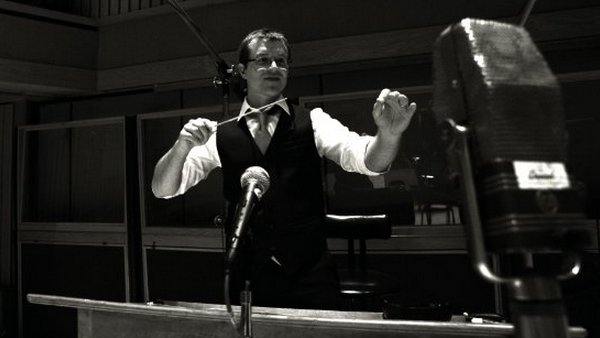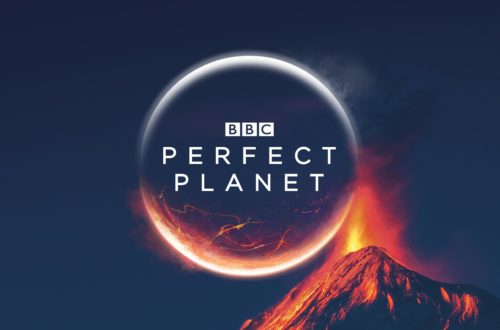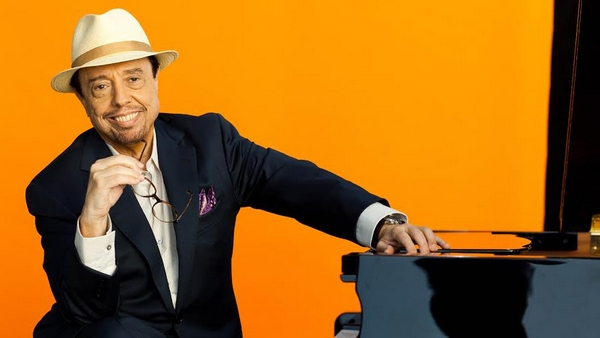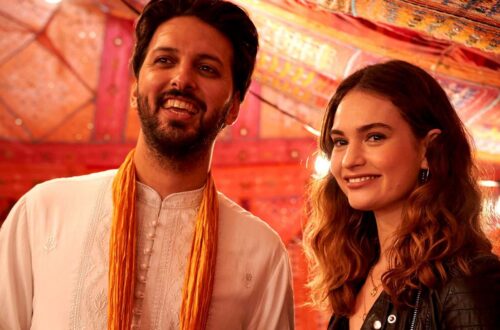 Composer, songwriter, performer, and orchestrator Joachim Horsley, generally referred to simply as “Jo” (pronounced “yo”) has an undeniable passion for music. His skill for enhancing both documentary and narrative films through music continues to pair him with the hottest established and up-and-coming directors.
Composer, songwriter, performer, and orchestrator Joachim Horsley, generally referred to simply as “Jo” (pronounced “yo”) has an undeniable passion for music. His skill for enhancing both documentary and narrative films through music continues to pair him with the hottest established and up-and-coming directors.
We recently spoke with Jo about his work on Lionsgate’s upcoming film Rapture-Palooza (starring Anna Kendrick, Craig Robinson, and Rob Corddry) which hits theaters this Friday June 7th. The film is an hysterically raunchy account of the end of days which includes, but is not limited to, the biblically above-mentioned Rapture (don’t worry, it really is funny) and features music that ranges from orchestral to rock to R&B, with many of the instruments performed by Joachim himself.
Joachim is a talented and accomplished musician who addition to expanding his film resume also just released his own debut album this Tuesday. The album Combinations is a collection of cinematic pop/rock songs which he wrote and performs. In addition to piano, Horsley plays organ, bass, guitar, ukulele, mandolin, charango, percussion, and sings. Joachim was a blast to speak with and his enthusiasm equally matches his musical talents. Below are the highlights from our time with him.
———————————————————————————————————————————————————-
– It’s great to be speaking with you Jo. I guess we’ll with start with the generic question of how you got involved with Rapture-palooza and when you got on board.
My understanding was that the film had been completed except for the final edit and final post and it was last Summer when I started working on it. The director and producer had gotten hold of some of my music and when they hired me we had a very quick turn around. But it was a real delight to work on the project because they were very very focused and very clear about what they wanted and I liked Paul Middleditch quite a bit right away. He had a great vision of the film and what the music in particular needed to do so it was just a wonderful process. We scored the film over the course of about 5 weeks and that was last September.
– Well if so much of the movie was done, tell us about the credit you have writing the hysterical song “Sexy Beast” featured in the film and the end credits. Did Craig Robinson have to go back and sing the lyrics to your music or what?
Well not really. What had happened was Craig Robinson had improvised a lot on set like this crass but laugh out loud tune in the movie called “I Want To Touch Your Booty” that he improvised but there was another scene where he came up with this rap called “I Am A Sexy Beast”. It’s an hilarious scene and a great
moment in the movie and when we were scoring the film, so much of his underscore was a certain kind of old funk and he, the director and I all shared a love of Isaac Hayes. So we thought it would be really interesting to do a kind of nod/dance track in the end credits that incorporated what Craig did in the movie and so it was pretty much a remix that I wrote with his dialog and I just built the track around that and that was the most fun piece to do in the whole production. Everyone was really supportive of that kind of thing and what was nice was that I had a lot of freedom to do some wacky stuff because the whole production is such a wacky concept and everyone’s really just going over-the-top. That’s why what I did was totally welcome and great for me to be able to do that and bring that along with the score. The score is all over the place in the sense that we were doing huge orchestral numbers and these small ensemble quirky pieces so it was a great opportunity to do all this different stuff but that was my favorite track to do.
– As funny as the film is, albeit catering to a very quirky sense of humor, how did you not just lose it when composing? Did seeing the completed film make scoring and creating themes any easier?
Oh my God, it was so funny, I love Rob Corddry and Craig Robinson, everything out of his mouth is gold, it’s just really really really funny. I did lose it, all the time, that’s the short answer. The good thing about that is when you’re laughing really hard and you musically have to stop composing that’s usually a good sign that I have to stop writing because if you’re so consumed with laughter you want to just stay out of the way. That’s something that I’ve really learned in doing comedies, that it’s really important to know when to stop. Timing is absolutely crucial in these situations and the comedians’ performances are so great that it’s really about giving a little bit of environment for them and keeping the themes returning in the movie. Basically when they’re performing, the music really just has to stay out of the way so there were a lot of opportunities to just sit back, laugh and enjoy it.
– That’s a really good and insightful point you brought up. Yes it is noticeable that there are musical gaps but there are a lot of diverse musical themes in the movie. Some are very short and quick cues except for some of the more orchestral and choral work. So was it easier or harder to do a lot of little themes as opposed to one sort of catch all and over-draping theme or suite?
Well the director Paul Middleditch told me think of this film as the “apocalypse at the end of your driveway”. So to me that sent a very clear message as to what was going to go on with the music. It couldn’t take itself too seriously of course, but at the same time the music wasn’t there to force the laugh but just help the actors do what they were doing very well. So in that sense it was very clear what to do in each scene, whether it is playing up something serious or something outlandish but in an organic way, not a formulaic joke-comedy-music approach. Even though there was a diversity to the genres, if you will, as long as I was focused on how the music related to the motivation of what what was going on on screen it was clear what I had to do. I’d have to say it’s easier with the little cues but it comes down to the performances which help me determine my direction and make it clear what I’m to do in each situation.
– Going back to Craig Robinson, one of the prevalent themes and one that’s easy to gravitate toward is the theme that introduces The Beast. It has this John Carpenter/Escape From New York electronic feel to it, that’s what I thought, but did you have anything in mind, or themes that inspired you while you were composing?
I’m a really big fan of Bernard Herman and Jerry Goldsmith and have studied their music quite extensively. So it was important to understand
the classic film scoring technique and a lot of the harmonies and melodies I chose come from that vocabulary. To me that made the most sense because The Beast is this absurd character, someone who takes himself to be this wonderfully evil villain and so it was important to stay in that vocabulary. It also worked in contrast to some of the funk we were doing and to the times the sound had more of contemporary harmony and structure. So much can be affected by contrast. One scene would be very orchestral and the next scene the characters would be walking down the street and there’d be crows swearing at them *laughs* so I used a sound like an organ playing in a church that no one visits and a ukulele at the same time. These kind of weird disparate sounds are what I was going for and since, in the move, the world is falling apart I designed a sound that is perpetually falling apart too. But going back to what you asked about inspiration again it comes down to the actor. I took more things from their performances to help me build the score than anything else.
– Your score for Rapture-palooza rode the multiple narrative waves very well and mirrors the multitude of themes styles found in your debut album Combinations which was just released this week. It’s an eclectic bag of songs and really kind of a cool definitely unique sound. Where did this come from and how did you start assembling the album?
My band LittleHorse, we have always been interested in doing rock & roll songs with a narrative, for example we wrote a song called “The Final Problem” which is the story of what Sherlock Holmes is saying to Professor Moriarty at the fall to their death at Reichenbach Falls. So we did a whole prog-rock song around that and that’s the kind of stuff we were into and when I started getting into film scoring. The reason I got into it was that I really loved telling stories with music. That’s what I’ve always wanted to do and film scoring was a perfect way for me to do it. When it came to doing this album I was working on film and orchestration projects for the last 3 years and whenever I would have break I’d go back to working on the record. But my goal was to always address the lyrical narrative the same way I address a film score,so I took the best songs I had, I’d probably written about 20-30 songs that I considered and whittled it down to the best 11 and for each of them I put down a vocal first with a rough skeletal track and then think about the lyrics and then, if this was a film think about how would I create
an environment for the story. That’s how I built each track. For example, “Kindness”, there’s percussion and I wanted to create a sense of rock bottom for the singer and to do that I used these giant frame drums. I wanted a sense of true bleakness and that necessitated using a diversity of instruments you don’t necessarily hear together.
Then there were other songs with a totally different arrangement and the narrative in something like “Cosmic Love Affair” was a nod to things that inspired me to go into film music in the first place, some of those great science fiction love stories and I wanted to have some sweeping strings, the kind of thing you’d find in a Dennis McCarthy score for Star Trek. I really wanted to combine that with sort of a slow Reggae style which I know sounds really weird but it felt like what was going to work for this narrative. That was my focus for the whole record, creating a world for a narrative which is exactly how think one should approach film scoring and that’s how the project started moving along and which is why I think it sounds like things from different prats of the world.
– Well it is very diverse and what you say makes sense, a song like “Time Machine” sounds like a story with something so much bigger going on behind it.
It’s funny you mention “Time Machine”. As the opener for the record I thought it would be appropriate since I feel like I’m from a different era myself and I
felt like writing something where the song is all about a guy who thinks he can fix his broken relationship by creating a time machine. It’s like he’s got a Rube Goldberg approach to fix his relationship in a completely obtuse and supernatural way yet he could pretty much fix his own problem by being less of a selfish human being. But in the same way I thought I’d do the same thing with the instrumentation and go overly obtuse. Something between an early James Bond song meeting something like Yes or Emerson, Lake & Palmer. I wanted to go over the top which reflects how we get so caught up in trying to fix a problem that we take the long and wrong way to do it. So that’s what that’s about, he wants to alter space time to fix a very human problem and that’s how the instrumentation reflects the narrative in that way.
– Your lyrics are impressive and well thought out. It seems like you put a lot more time into one verse than some artists put into an entire song which makes each track like going on a journey and makes it fun and interesting to listen to. Calling the album Combinations really says it all and epitomizes the sound you’ve created. You mentioned the people who influenced you cinematically but what kinds of music did you grow up listening to?
I remember the day that my Dad played me the Paul Simon album Graceland. We were driving back from visiting my cousin and we stopped off at a gas station to buy the cassette. He put it on and it was one of those moments where you feel like the river between your heart and your soul gets reversed you know? It was probably the earliest most moving musical experience that I could remember. The way he was speaking and singing, I didn’t realize you could do things like that lyrically and I hadn’t heard anything like it. From that moment on I really held him up as the best lyrical storyteller because of the imagery he creates on something like “Rhythm of the Saints”, that to me is something to aspire to. I really do appreciate you mentioning the lyrics because I put a tremendous amount of time and energy into making sure the lyrics are just right. I revise them right down to the last minute. In fact, throughout the process the way I work is I sing a lead vocals first but I end up replacing it throughout the production with different lyrics and even when I’m mixing I end up re-singing a lot of the lead vocals because I want to change certain aspects of the lyrics.
Sometimes there are certain words that take you out of the mood. It really is like filmmaking. When something happens that takes you of the story, whether it’s bad acting or editing or an underscore you notice as you’re watching you get taken out of the experience. To me that’s a deal breaker and the worst thing you can do for a film. To me, songwriting is the same way, unless the lyrics are really right they’re going to take you out of it. That’s also why I have a hard time not mixing my own material because I edit right until the day before I master. But thanks for noticing the lyrics. I think they’re the most important thing in a song, more important than the melody or harmony in a way because if you can create a visual or story in the mind of the listener you win.
I think there are a lot of artist out there who put a lot of work into their lyrics. Many times people don’t listen to them until the 3rd or 4th time maybe. A song like “Come Together” by The Beatles that to me is a great lyric because that song is about something, it has a great mood and a great vibe but people endlessly speculate on what the song is about. It kind of engages your imagination in a way like nothing else and to me the lyrics are hat keeps bringing you back to the song and make it last.
Music is poetry so it’s good to know there’s artists like you out there who care about the message. So for our last question I’ll go back to something you hit on earlier which was Jerry Goldsmith. I’m a big fan myself so tell me what are some of your favorite Goldsmith scores?
I’d have to say Basic Instinct. *laughs* I wish as a kid I had paid more attention to the music as opposed to everything else going on that would interest a 14 year old *laughs*. That is one of the best scores ever and Jerry was a master at a lot of things but in this case his use of harmony and median modulations, in other words he would create these pieces that would never really end, they would just kind of lead into the next thing so his technique was just incredible. I love Total Recall which is such a great score and those stick out as my two favorites. Oh and Alien! That’s one as well that I gravitate toward. A lot of vocabulary that he established is superb. From ways to be distant, to ways to make the audience uncomfortable with the orchestra, it’s all amazing. I mean it’s not challenging for anyone to make noise but I find the techniques Jerry developed t be brilliant. He’s the man, no question about it.
———————————————————————————————————————————————————-
You can get more info on Joachim as well as his debut album “Combinations” at his website – LittleHorsemusic.com and check out the redband trailer for Lionsgate’s Rapture-palooza below.



